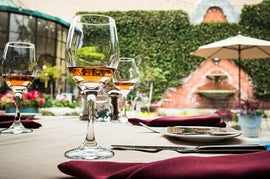With “minimal intervention” all the rage in winemaking these days, sometimes it’s easy to overlook just how much work it takes to conduct grape to glass as unobtrusively as possible. The two winemakers we are spotlighting this month - Albert Jané from Priorat in Spain and Phillipe Tessier in Cheverny, France - have spent years laboring mightily in the vineyards so they can stay out of the way in the cellar. They both meticulously tend and harvest their vines by hand, utilize only native yeasts and used or neutral oak, and bottle with little or no fining or filtration. Each produces wines that feel deceptively effortless, showing poise and exuberance in equal measure.
Priorat is a tiny, rural appellation in southwestern Catalonia; only two hours from Barcelona, but quite remote. Though it is one of only two Spanish wine appellations (the other is the much larger Rioja) to enjoy a DOCa classification, Spain’s highest mark of quality, Priorat’s steep hillside terrain and intense daytime heat make for difficult growing conditions and extremely low yields. The attraction, for the winemakers who do the hard work and the drinkers who pay the high prices, is Priorat’s distinctive soil composition, a rocky iron-rich blend of black slate and quartz known as llicorella, which reflects sunlight and conserves heat, and imparts to the (mostly red) wines a rich depth of fruit and uniquely concentrated minerality obtainable nowhere else.
Albert Jané is a fourth-generation winemaker, originally from Penedes in Southeastern Catalonia. He founded Acustic Celler in the large, mountainous Monsant DO that encircles Priorat in 2004. In 2010, smitten with Priorat’s singular terroir, he started Ritme (rhythm in Catalan) to work organically with native Priorat varietals. Though Cabernet Sauvignon, Syrah and Merlot are all frequently featured in Priorat reds, Jané exclusively uses 35-80-year-old bush vines of Carignan (also known locally as Samsó) and Garnatxa, with a particular emphasis on the former. His wines retain all of the power and individuality of Priorat with none of the heaviness; they are remarkably lithe for their size.
Phillip Tessier also comes from a wine-making family. His father, Roger Tessier, founded the Domaine that bears their name in 1961, when he decided to plant some grape vines on his asparagus farm in Cheverny, in the northeastern corner of Touraine, in the Loire Valley. Frequently overlooked/underrated compared to its more established Loire neighbors, the Cheverny AOC has in recent years become a real hub of hands-off winemaking, thanks in large part to Phillippe’s example. He began working in the vineyards in 1981, eventually taking over from his father, converting to organic viticulture in 1998 and becoming Eco-certified in 2002. 2018 was his last harvest at the helm; his son Simon is taking the reins (though Tessier pere remains omnipresent; “Phillippe lives and breathes the vineyards”, says Simon.) The quality of the 2019 Cheverny Blanc, as fresh and vital as ever, suggests a seamless transition.
Cheers,
The PlumpJack Wine Buying Team
Ritme Cellar Priorat $25/btl $270/case
About the winery: Ritme Cellars is located on the outskirts of La Vilella Alta, in an old farm that has been completely transformed into a winery of 550 square meters, along with a 100 square meter tasting room. It boasts an ideal location, facing the Montsant mountain range and the town of La Figuera, with incredible views and tranquility. Currently the project includes the organic cultivation of almost 20 hectares. There are 14 hectares on the estates that it owns, given over mostly to vines, and a further 6 hectares of leased vineyards throughout the DOQ.
About the winemaking: 70% Carignan, 30% Garnatxa. Old vines grown at 300-700m of altitude. Destemmed and macerated for around 15 days. Aged in used French barrique for 10 months. Practicing Organic.
Tasting Notes: Leads with a nose of red and dark berry fruit with hints of licorice. Has a medium bodied palate with vivid cherry skin and blackberry notes presaging a long granite and spice finish.
Suggested Food Pairing: Lamb with garlic and rosemary; Chorizo and white bean stew; Roasted vegetables; Catalan Lentil Soup with Picada.
Phillipe Tessier Cheverny Blanc $25/btl $270/case
About the Winery: The vineyard exists in a microclimate that keeps the vineyards cool, situated between the Loire River and the forest of Cheverny, Chambord and Solonge. The region's soil is comprised of sand, clay, limestone, as well as ancient marine sediment, and the vines can be up to 90 years old. Tessier makes a point to practice and promote small-farm viticulture.
About the winemaking: Coming from younger vines (less than 20 years of age) a blend of 80% Sauvignon Blanc, 15% Chardonnay and 5% Orbois. Vinification in stainless steel vat using native yeasts. Malolactic fermentation complete. Aged in a combination of stainless steel and old neutral barrels.
Tasting Notes: Aromas of apple, lemon zest, and white flower on nose; palate adds grapefruit, peach and beeswax. Lush body with great structure and acid.
Suggested Food Pairing: Goat cheese and arugula salad, Grilled salmon with fennel-olive relish, Poached shrimp with Thai basil and peanuts.




